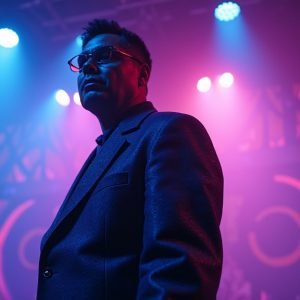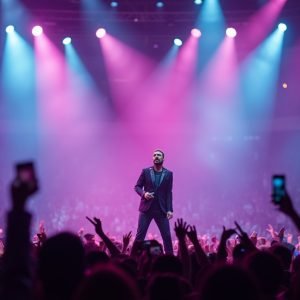Rosalía‘s “Berghain“: A Thundering Operatic Goth-Pop Fusion Sparks Debate
Rosalía, the boundary-pushing artist celebrated for her innovative fusion of traditional and contemporary sounds, has once again captured global attention with the release of her latest single, “Berghain.” This ambitious track, featuring collaborations with musical titans Björk and Yves Tumor, is the lead single from her forthcoming album, “Lux,” set for release on November 7, 2025. “Berghain” has ignited a fervent discussion among critics and fans alike, with its dramatic blend of operatic vocals, lush orchestral arrangements, and a dark, ethereal atmosphere, prompting a central question: is it a groundbreaking goth-pop hit, or does it transcend into the realm of opera, a true classical fusion? The impact of Rosalía’s “Berghain” is undeniable, making this a crucial Rosalía Berghain song review.
Rosalía “Berghain”: A Sonic Tapestry of Collaboration and Classical Grandeur
“Berghain” stands as a testament to Rosalía’s evolving artistic vision, moving away from the experimental reggaeton and electronic textures of her acclaimed 2022 album “Motomami.” This Rosalia new music release embraces an ethereal, spiritual, and decidedly orchestral sound, featuring the formidable London Symphony Orchestra. The song’s composition is a complex tapestry, incorporating German, Spanish, and English lyrics, sung by Rosalía, Björk, and Yves Tumor. The track opens with German verses delivered by a choir, described as “Seine Angst ist meine Angst, Seine Wut ist meine Wut, Seine Liebe ist meine Liebe, Sein Blut ist mein Blut” – translating to “His fear is my fear, His anger is my anger, His love is my love, His blood is my blood.” The operatic elements in Rosalía’s “Berghain” are undeniable, making this Berghain song review essential.
The collaboration with Björk marks their second musical outing, following their 2023 charity single “Oral.” Yves Tumor’s contribution adds another layer of avant-garde intensity to the track. The production, helmed by Rosalía herself alongside Noah Goldstein, Jake Miller, and Sir Dylan, is described as the “grand orchestral centerpiece” of “Lux’s” second movement. The music video, directed by Nicolás Méndez, visually complements the song’s dramatic arc, filmed in Warsaw and featuring the London Symphony Orchestra accompanying Rosalía through everyday moments, adding a surreal and cinematic quality to this ambitious goth pop opera.
Navigating the Operatic Debate on Rosalía’s “Berghain”
The core of the critical discourse surrounding “Berghain” lies in its classification. While many critics have lauded its experimental fusion and its “thundrous goth-pop” sound, the inclusion of operatic vocals and classical arrangements has led some to question its relationship with traditional opera. Opera, historically, is a complex art form combining music, drama, and visual spectacle, typically featuring a libretto (text), arias (solo songs expressing emotion), and recitative (speech-like singing to advance the plot), all performed with orchestral accompaniment. The powerful vocals in Rosalía’s “Berghain” certainly evoke operatic grandeur.
Classical music enthusiasts and critics have noted the song’s influences, drawing parallels to the Baroque era, such as the dramatic strings of Vivaldi and the grandeur of Bach or Handel. Linton Stephens, a classical musician, points out Rosalía’s formal classical training evident in the track, remarking on how she seamlessly morphs genres from traditional to modern. However, some argue that opera requires a specific structural and performative adherence that “Berghain,” with its contemporary production, electronic undertones, and amplified effects, may not fully embody. The song’s extensive use of amplification and effects, while contributing to its modern edge, is seen by some purists as a departure from the acoustic principles traditionally associated with opera. Yet, others champion it as an evolution, a bold step in genre-bending that pushes artistic boundaries, with Rosalía’s vocal performance being described as “aria-like.” This Rosalia new music release from Rosalía, “Berghain,” challenges conventional definitions.
Rosalía’s Career Trajectory: From Latin Roots to Global Avant-Garde
“Berghain” also serves as a point of reflection on Rosalía’s broader career. Her previous album, “Motomami” (2022), was celebrated for its bold exploration of various Latin music styles, including reggaeton, bachata, and flamenco, alongside experimental electronic elements. This album demonstrated her prowess in modernizing traditional sounds and infusing them with contemporary influences, a move that solidified her status as a significant figure in global music. Her success with “Motomami” was built on a foundation of fearless musical fusion, earning her numerous Latin GRAMMY Awards and critical acclaim. The anticipation for the Lux album, and further exploration of Rosalía’s unique sound, is immense.
With “Berghain,” Rosalía appears to be charting a course towards an even more ambitious and monumental aesthetic, presenting pop music as symphonic performance art. Her career trajectory showcases a consistent effort to challenge cultural hierarchies and redefine genre expectations, moving from her flamenco roots to a more experimental, global avant-garde. The inclusion of diverse languages and collaborators like Björk collaboration underscores her commitment to a multifaceted artistic identity that embraces complexity and innovation. While the debate over whether “Berghain” is opera continues, its impact is undeniable, signaling Rosalía’s unwavering dedication to pushing the envelope in contemporary music, solidifying her place in avant-garde music discussions.


























